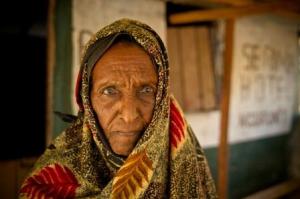After lunch, we drive outside of town to a local campsite with thatched huts, a long drop latrine and real showers that come down from a large water container perched above a small surround of reeds. The dramatic mountains provide a stunning backdrop to the setting. We rest in the afternoon, moving our bodies to different positions in order to catch any amount of breeze in the stifling heat. Before the sun sets, we visit some of the new BOMA businesses in town. Lawrence, BOMA’s village mentor in Ngurunit, is proud of the progress that the groups are making and we observe him reviewing the newly –designed record books with the groups. Record keeping of all transactions is an activity that we encourage in order to ensure full transparency for all group members, thereby minimizing conflict. While the groups are new, having just been launched in early January, they are enthusiastic and hopeful that the income from their businesses will help them survive the dry season.
We return to camp before dark. The temperature finally drops and after dinner, Kura spots the fires from the warriors who have climbed up to the top of the mountains with their cattle. Using his flashlight, he sends a signal. After a short while the warriors flash him back. The women in the village sing songs late into the night.
The next day, we start the morning slowly; tea for the Kenyans and coffee for the mzungus, brewed in the coffee press that I bought at the last minute before leaving Nanyuki. James, the local camp manager, brings us njera – a type of Somali pancake. Kura looks refreshed after a shower and his first cup of sweet tea. His open smiling face and kind gaze makes him easy to like and he has gone out of his way to make David and Corwin feel welcome. We finish off our breakfast with ripe mangoes and sliced oranges. As the juices drip down our chins, we are laughing, enjoying the stories that Kura tells so well.
One story stands out – the story of the snake that vomits a glowing light. In the mountains high above our camp, there is a large snake that hunts at night. When he is close to his prey, he vomits up an ostrich egg-sized glowing light. His victims are curious about the strange light and when they get close, the snake pounces, constricting the victim’s body until it dies. Once his prey – usually a goat or gazelle- is killed and consumed, the snake then re-swallows the light, saving it for his next quarry.
On our way out of town, we stop to see my friend, Amina Rage. We park outside a low plastered building with a thatched hut. “Amina Rage!” I yell. To which the 80 + year old Amina Rage responds “Amina Rage!” Her eyes are sparkling with mischief as she wraps her thin arms around my waist and hugs me tight.
“I heard you were here and have baked you a cake,” she tells me in Swahili. From a table on the porch, she presents me with a small round package, wrapped in newspaper and black plastic. I express my condolences for the recent loss of her son and she looks down at the ground, tears in her eyes. “Nakupenda, Amina Rage,” I tell her. (I love you). “Ohh, ohh,” she moans softly, “Nakupenda, Mama Rungu.”
David agrees to photograph Amina Rage for me and she stares intensely at the camera as if it is another foe that she needs to conquer. Her eyes reflect all the sadness of a hard life. I blink back the tears as we say goodbye and she stands in the dusty road, waving goodbye until we are out of sight and headed into the blinding heat of the Kaisut.

